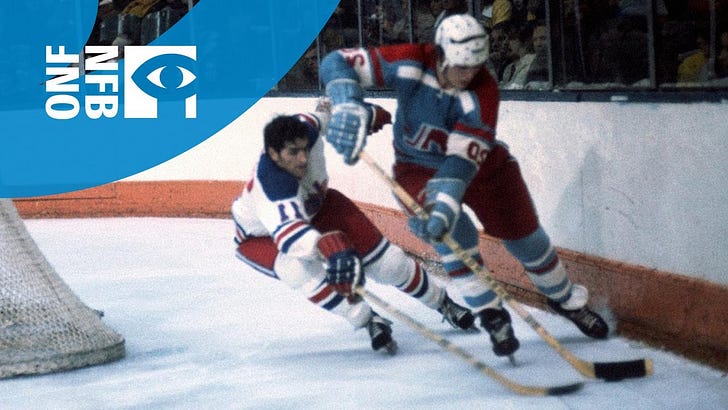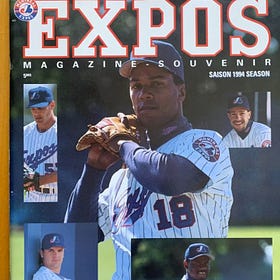Video Gems: "Just Another Job"
“I haven’t played hockey in Quebec since I was 13 years old,” Jacques Blain says to the documentary crew following his quest to join the Quebec Nordiques of the fledgling World Hockey Association. “And I’ll tell you one thing: Ever since I was small…even I was Junior, my fondest dream of what I’ve always wanted was to play in Quebec in front of my own people; say, the French people.”
Long before HBO’s “Hard Knocks” became a central part of the build to each NFL season, Canada’s National Film Board aired a short called “Just Another Job.” Produced in a way immediately recognizable to modern audiences as a “Hard Knocks” prototype, director Pierre Letarte follows the roster formation of the first-ever Quebec Nordiques team in 1972 through the perspective of a starry-eyed hopeful aiming just to make the cut.
That hopeful is Jacques Blain, a defenseman born in Gatineau, Quebec. Blain played in the Ontario Hockey Association Junior A with the famed Toronto Marlboros, winning a championship on a squad led by future Buffalo Sabres GM (and Philadelphia Flyers nemesis) Gerry Meehan.
The legacy of WHA 45 years after its closure is built on names like Bobby Hull and Gordie Howe — legends who gave the fledgling league credibility at inception — or Wayne Gretzky, whose transcendent professional career began as the star of the only surviving WHA franchise.
However, Blain is a perfect avatar for the real make-up of the WHA: A fringe top-league dreamer chasing an opportunity the NHL would never provide.
A personal aside, an impulse purchase of the terrific book Hockey Night Fever by Stephen Cole last summer ignited a curiosity in 1970s hockey that I am still exploring. Hockey Night Fever led me to read The Rebel League by Ed Willes, a Canadian sports journalist who also wrote an outstanding history of the CFL’s short-lived American expansion.
The Rebel League dives into the history of the WHA, a fascinating league that was more American Basketball Association in execution than it was American Football League — not surprising, given some of the same people behind the formation of the ABA helmed the launch of the WHA.
Like the ABA, the WHA’s short history is marked with exasperating failures: The Philadelphia Blazers’ inaugural home game had to be canceled when the Zamboni crashed through the ice, and the popular Minnesota Fighting Saints ceased operations during the season when management could make payroll.
But also like the ABA, the WHA profoundly changed its sport by given players more leverage when negotiating with organizations. The WHA launched its share of stars, and offered a final stage for others to bid farewell. And the WHA gave hope to players like Jacques Blain.
The Quebec Nordiques have long been an intriguing oddity to me, their existence mostly predating my introduction to hockey. When the Colorado Avalanche trounced the Florida Panthers en route to the 1996 Stanley Cup — one of the earliest Stanley Cup Finals I can remember following — I was baffled as to how a franchise with the roster that arrived in Colorado readymade for success could need to relocate.
This is something I touched on in my column on the 1994 Montreal Expos here at The Press Break. In my mind, there’s a bond between the Expos and Nordiques — despite Montreal and Quebec City being much different with some sense of rivalry.
What-If Wednesday: The 1994 Major League Baseball Strike & The Death of the Montreal Expos
Ways in which the 1994 strike changed the landscape of Major League Baseball have been dissected ad nauseum over the last 30 years, including the tangible, financial implications of the work stoppage. But, in case you didn’t realize it, this ain’t Sportico, pal. The Press Break specializes more in the intangbile, and the MLB strike certainly produced a …
Quebec City is the much more working class community. So, when the economic hardships that hit Canada in the mid-1990s and contributed to the Expos’ inability to maintain their outstanding 1994 roster, Quebec City felt an even harder pinch.
“Just Another Job” predates the Nordiques’ final season in Quebec by 23 years. Viewed with hindsight, one can see the direct line from the franchise’s hopeful debut to its unfortunate end.
Another lens through which it helps to view “Just Another Job” is knowing a little about the Quebec sovereignty movement. A testament to my American myopia, before reading Hockey Night Fever I knew next-to-nothing about the political turmoil that persisted between Canada’s French- and English-speaking communities.
Now I know only slightly more than next-to-nothing about this deep, nuanced rivalry — like that in the years directly preceding launch of the WHA, the Front de Liberation du Quebec emerged as a fearsome separatist organization that didn’t shy from political violence.
Approached with this in mind, the incredibly of-its-time PSA that appears before “Just Another Job” exists as more than just a kitschy bit of ‘70s media.
Likewise, the documentary itself is more impactful understanding the deep connection and pride a Quebecois athlete must have felt representing Quebec City as a Nordique.
Jacques Blain did so for exactly 50 games in the 1972-73 WHA season, during which he recorded 10 assists, one goal and 78 penalty minutes.




